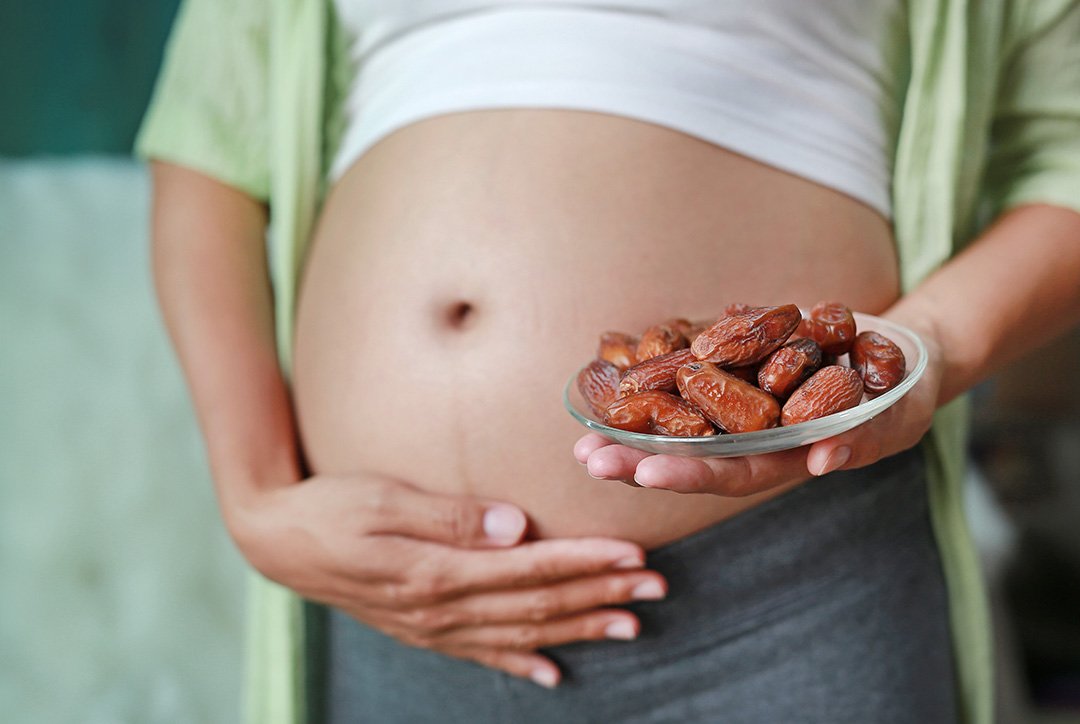Savor the Date: How This Sweet Fruit Supports Pregnancy Wellness
Do you like eating dates? Perhaps you have experienced and unexpected craving for them since you learned you are expecting. If dates are on your mind, it’s for good reason. Dates are an amazing superfood and are packed with nutrients that can offer numerous health benefits to pregnant women. Today we discuss the nutritional value of dates, their health benefits during pregnancy, and how they can be incorporated into a pregnant woman’s diet.
Nutritional Profile of Dates
Dates are a rich source of vitamins and minerals. They are particularly high in fiber, which can help prevent constipation, a common issue during pregnancy. They also contain a significant amount of natural sugars, making them an excellent source of energy. In addition to fiber and sugars, dates are packed with potassium, magnesium, and vitamin B6, all of which play crucial roles in pregnancy health.

Potassium helps maintain electrolyte balance and regulate blood pressure, which is vital during pregnancy to prevent conditions such as pre-eclampsia. Magnesium supports muscle and nerve function and helps build strong bones and teeth for both the mother and the baby. Vitamin B6, meanwhile, is essential for the development of the baby’s brain and nervous system and can help alleviate nausea in pregnant women.
Benefits of Eating Dates During Pregnancy
Eases Labor and Delivery
One of the most talked-about benefits of eating dates during pregnancy is their potential to ease labor and delivery. A study published in the Journal of Obstetrics and Gynaecology found that women who ate dates daily during the last few weeks of pregnancy were more likely to go into labor naturally and had significantly shorter labors compared to those who did not consume dates.
Reduces the Risk of Anemia
Anemia is a common problem during pregnancy due to the increased demand for iron. Dates are a good source of iron, which helps in the formation of red blood cells and can reduce the risk of anemia. Consuming dates regularly can help boost your hemoglobin levels, ensuring adequate oxygen supply to both you and your baby.
Regulates Blood Sugar Levels
Despite their sweetness, dates have a low glycemic index, which means they can help regulate blood sugar levels. This property makes them an excellent snack for pregnant women, particularly those who are at risk of gestational diabetes.
Promotes Fetal Development
The vitamins and minerals found in dates are crucial for the healthy development of the fetus. Folate, for instance, helps prevent neural tube defects, while vitamin K is essential for the baby’s bone development. The nutritional content of dates supports overall fetal growth and development, making them a valuable addition to a pregnancy diet.
Incorporating Dates into Your Pregnancy Diet
Dates are versatile and can be incorporated into your diet in various ways. You can eat them whole as a quick snack or chop them up and add them to your yogurt, cereal, or smoothies. Dates also work well in baked goods, providing natural sweetness and moisture. When selecting dates, look for those that are plump and have a glossy appearance, which indicates freshness.
It’s recommended to start with a small amount, such as one or two dates a day, and gradually increase the intake to about six dates daily during the last few weeks of pregnancy, as suggested by some studies. However, it’s important to consult with your healthcare provider before making any significant dietary changes during pregnancy, especially if you have conditions like gestational diabetes.
Dates are a nutritional powerhouse that can offer numerous health benefits to pregnant women. Their rich nutritional profile supports both the mother’s and baby’s health, potentially easing labor and promoting fetal development. By incorporating dates into a balanced diet, pregnant women can enjoy not only their sweet taste but also the myriad of health benefits they provide. However, it’s crucial to remember that moderation is key and to consult with a healthcare provider or your midwife to ensure that adding dates to your diet is appropriate for your specific health situation.




